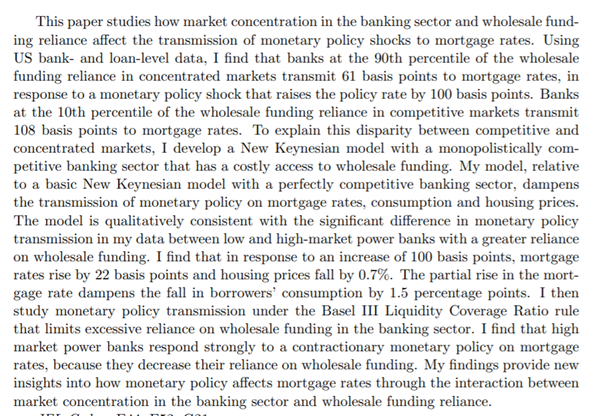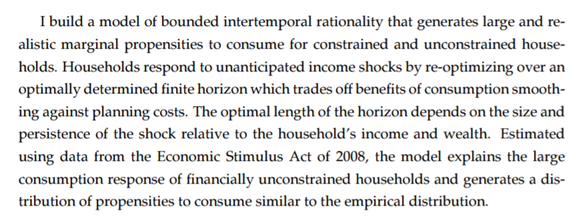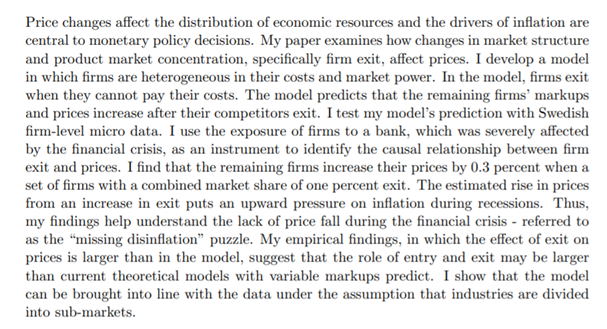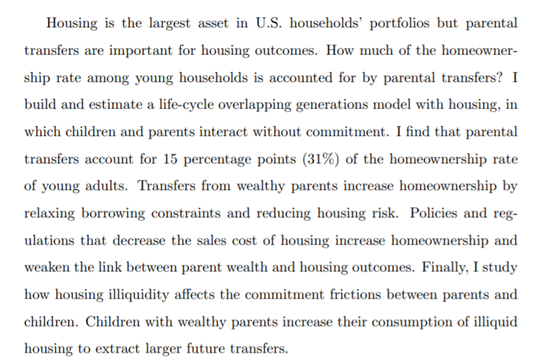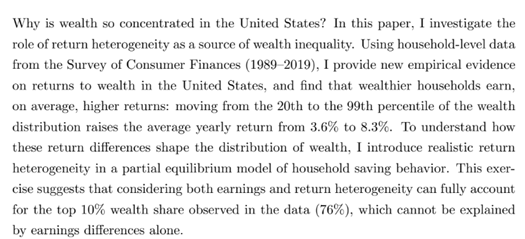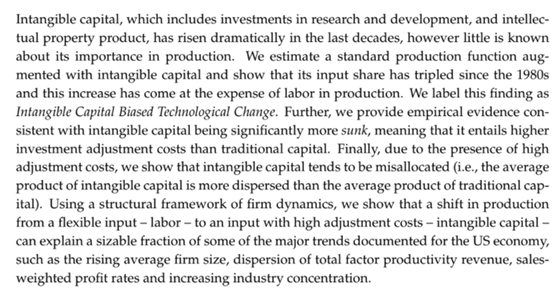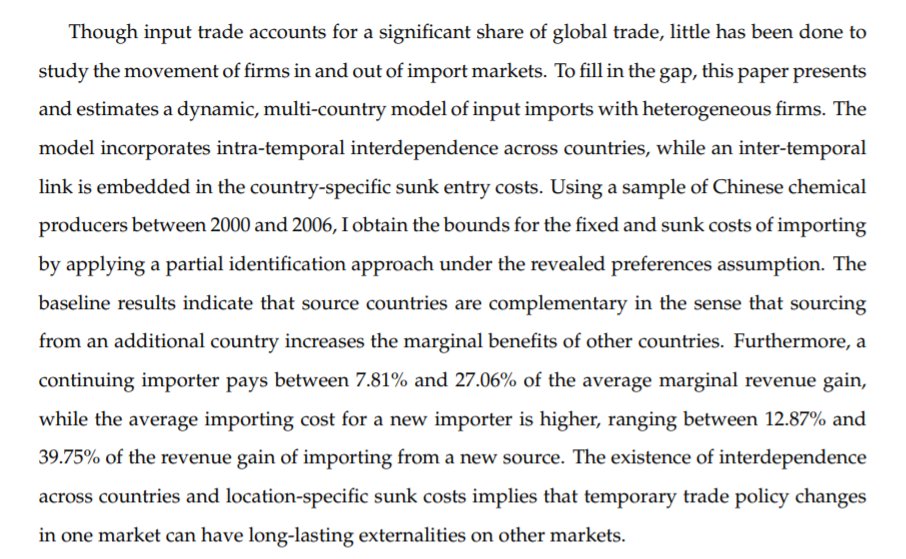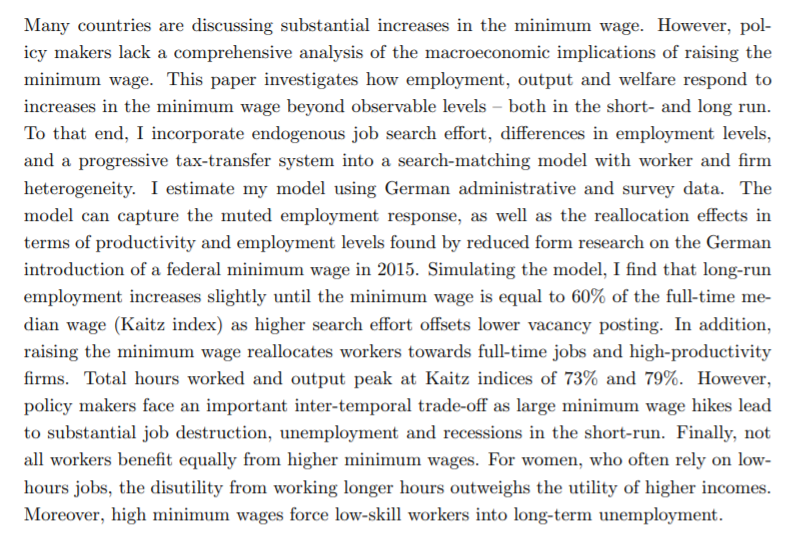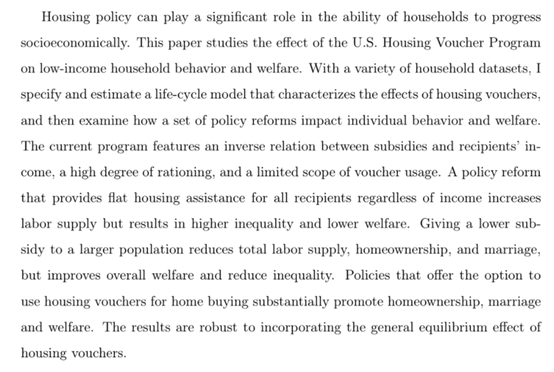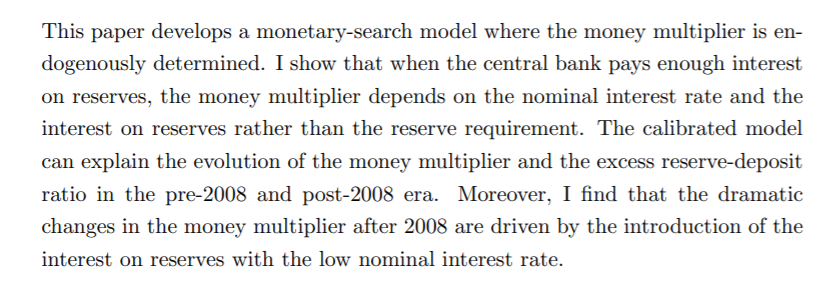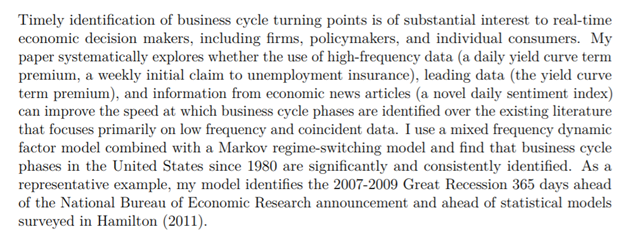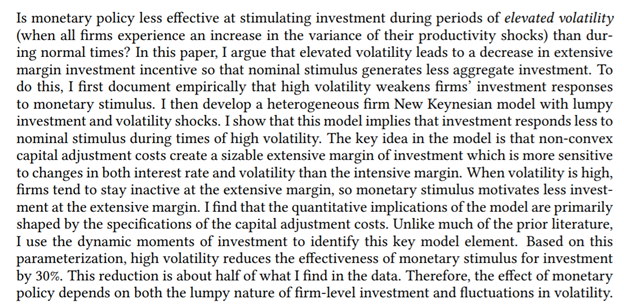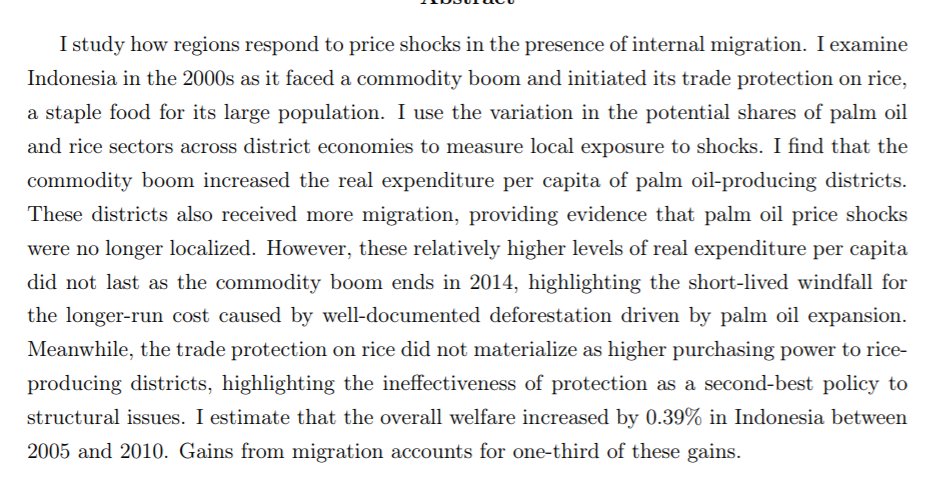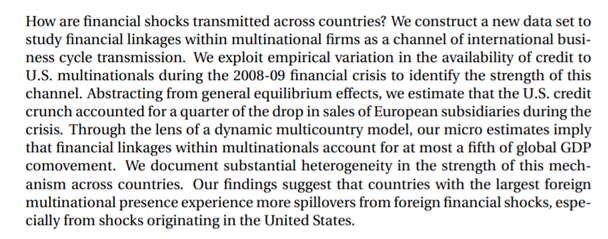the future of macroeconomics is bright!
you will often hear me say that. why? what makes me absolutely sure it's true? [no, it's not a low bar of our current state. we all stand on shoulders of giants.]
it's the exciting research from early-career scholars.
you will often hear me say that. why? what makes me absolutely sure it's true? [no, it's not a low bar of our current state. we all stand on shoulders of giants.]
it's the exciting research from early-career scholars.
over the past several years, I have had the privilege of meeting many PhD students and reading their research. I am always struck by breadth of topics they tackle and the innovative approaches they use.
thread with some I've met last year and who are currently looking for jobs.
thread with some I've met last year and who are currently looking for jobs.
Amina Enkhbold
Ph Candidate at University of Toronto
@amina_enkhbold
https://sites.google.com/view/aminaenkhbold
Ph Candidate at University of Toronto
@amina_enkhbold
https://sites.google.com/view/aminaenkhbold
Amina Enkhbold:
“Monetary Policy Transmission, Bank Market Power, and Wholesale Funding Reliance”
https://amina-enkhbold.github.io/Enkhbold_JMP/Enkhbold_JMP.pdf
“Monetary Policy Transmission, Bank Market Power, and Wholesale Funding Reliance”
https://amina-enkhbold.github.io/Enkhbold_JMP/Enkhbold_JMP.pdf
Enkhbold contributes to our understanding of how market power of banks and source of funding for mortgages—deposits or wholesale—affect economic activity after a change in the federal funds rate. That “pass through of monetary policy" determines how effective policy is.
Michael Boutros
“Bounded Intertemporal Rationality and the Marginal Propensity to Consume”
http://www.michaelboutros.com/papers/Boutros_BIR_202012_1.pdf
“Bounded Intertemporal Rationality and the Marginal Propensity to Consume”
http://www.michaelboutros.com/papers/Boutros_BIR_202012_1.pdf
Boutros contributes to our understanding of how spending out stimulus (“marginal propensity to consume”) depends on how much people have in easily accessible savings (little =“liquidity constrained”) and how costly is to plan about future spending (more ->“bounded rationality”).
Melinda Suveg
"Does Firm Exit Increase Prices?"
https://drive.google.com/file/d/1vK-EW_6-xdVh_f15Bct2spvyjAVHkyvd/view
"Does Firm Exit Increase Prices?"
https://drive.google.com/file/d/1vK-EW_6-xdVh_f15Bct2spvyjAVHkyvd/view
Suveg contributes to our understanding of how shifts in market concentration among firms—due to exit during recessions—affects inflation. Her work helps us understand the “missing disinflation” that is, less of a step down in inflation during the Great Recession than expected.
Eirik Brandsaas
“Illiquid Homeownership and the Bank of Mom and Dad”
http://papers.eebrandsaas.com/Homeownership_BankOfMomAndDad.pdf
“Illiquid Homeownership and the Bank of Mom and Dad”
http://papers.eebrandsaas.com/Homeownership_BankOfMomAndDad.pdf
Brandsaas contributes to our understanding of how financial resources within families affect wealth of the next generation. As is common in macro, his study goes beyond first round effects, showing how wealthy children change their behavior to get more money from their parents.
Inês Martins Xavier
Pompeu Fabra https://www.inesxavier.com/contact
Pompeu Fabra https://www.inesxavier.com/contact
Inês Martins Xavier
“Wealth Inequality in the US: Role of Heterogeneous Returns”
https://www.dropbox.com/s/njzzx31616uek7p/JMP_Xavier.pdf?dl=0
“Wealth Inequality in the US: Role of Heterogeneous Returns”
https://www.dropbox.com/s/njzzx31616uek7p/JMP_Xavier.pdf?dl=0
Martins Xavier contributes to our understanding of how differences in investment returns of the wealthiest families help explain wealth inequality. Differences in labor income are not enough.
Sampreet Singh Goraya
“The Rise of Intangible Capital and the Macroeconomic Implications”
https://drive.google.com/file/d/1Yj6Ztx-8wXRlZlDomMHiQLKPu_FDXR-V/view
“The Rise of Intangible Capital and the Macroeconomic Implications”
https://drive.google.com/file/d/1Yj6Ztx-8wXRlZlDomMHiQLKPu_FDXR-V/view
Goraya contributes to our understanding of how intangible capital, such as research and development, affects firm size, productivity growth, market concentration. GDP was initially designed to measure physical capital. That’s changing and his research shows why that’s important.
Trang Hoang
"The Dynamics of Global Sourcing"
https://trangthhoang.github.io/2020_job_market/Hoang_JMP.pdf
"The Dynamics of Global Sourcing"
https://trangthhoang.github.io/2020_job_market/Hoang_JMP.pdf
Hoang contributes to our understanding of how global sourcing of inputs by firms affects their profitability and creates interconnectedness across countries. Her work has implications for trade policy.
Drechsel-Grau contributes to our understanding of the longer-term effects of minimum wage increases on employment. In contrast, much of the scholarship on minimum wages focuses on near-term effects. He also looks at effects across different groups of workers.
tagging in @MoritzDG, whose research it is ...
and forgot to tag in @TrangThHoang whose paper is before Moritz in this thread ...
Ning Zhang
“The Effect of Housing Vouchers on Household Behavior and Welfare”
https://drive.google.com/file/d/1Bqvxpl2b4Tk_Nhe5ohu5F9PVxm0HaKfK/view
“The Effect of Housing Vouchers on Household Behavior and Welfare”
https://drive.google.com/file/d/1Bqvxpl2b4Tk_Nhe5ohu5F9PVxm0HaKfK/view
Zhang contributes to our understanding of how the structure of housing assistance affect household decisions—like working, homeownership, and marriage—as well as overall inequality and wellbeing.
Heon Lee
“Money Creation and Banking: Theory and Evidence”
https://leeheon.github.io/papers/mcreation.pdf
“Money Creation and Banking: Theory and Evidence”
https://leeheon.github.io/papers/mcreation.pdf
Lee contributes to our understanding how Federal Reserve policy, especially since the Great Recession, affects the money multiplier—the ratio between initial deposits at a commercial bank and the overall money supply.
Xiang ‘Ivy’ Li
“Nowcasting Business Cycle Phases with High-Frequency Data”
https://lx0413.github.io/files/Xiang-Ivy-Li_JobMarketPaper.pdf
“Nowcasting Business Cycle Phases with High-Frequency Data”
https://lx0413.github.io/files/Xiang-Ivy-Li_JobMarketPaper.pdf
Xiang ‘Ivy’ Li contributes to our understanding of how to identify a recession. She uses weekly and daily economic data in a regime-switching factor model to quickly call a recession. (PS She beats the Sahm rule by a few months in Great Recession and the NBER by a year.)
Min Fang
“Lumpy Investment, Fluctuations in Volatility, and Monetary Policy”
https://ethanminfang.github.io/minfang.github.io/files/JMP_Fang.pdf
“Lumpy Investment, Fluctuations in Volatility, and Monetary Policy”
https://ethanminfang.github.io/minfang.github.io/files/JMP_Fang.pdf
Min Fang contributes to our understanding of how firm uncertainty about their productivity affects the ability of monetary policy to stimulate investment. This means the effectiveness of Fed policy in a recession depends on the economic context in which firms are operating.
Rizki (Kiki) Nauli Siregar
"Global prices, trade protection, and internal migration:
Evidence from Indonesia" http://rizkisiregar.org/files/Rizki%20Siregar%20-%20JMP.pdf
"Global prices, trade protection, and internal migration:
Evidence from Indonesia" http://rizkisiregar.org/files/Rizki%20Siregar%20-%20JMP.pdf
Rizki (Kiki) Nauli Siregar contributes to our understanding of how global commodity price shocks change internal migration patterns within a developed country, specifically Indonesia. Trade protection policies are ineffective at addressing the geographic disparities.
Maryn Bolhuis
“Financial Linkages and the Global Business Cycle”
https://sites.google.com/site/mabolhuis/research?authuser=0
“Financial Linkages and the Global Business Cycle”
https://sites.google.com/site/mabolhuis/research?authuser=0
Maryn Bolhuis contributes to our understanding how financial shocks—such as those that originated in the U.S. mortgage markets and caused the 2008-09 global financial crisis—spread in the economies across countries. His work focuses on the role of multinational firms.

 Read on Twitter
Read on Twitter
